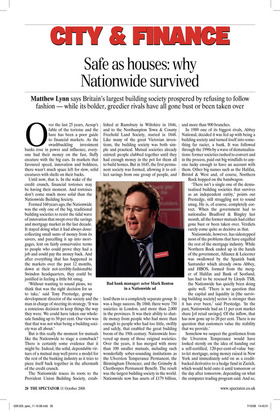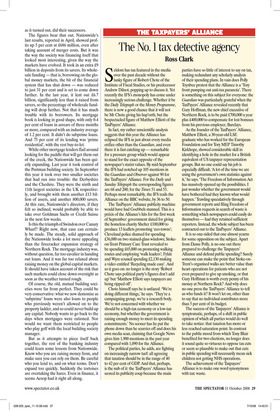Safe as houses: why Nationwide survived
Matthew Lynn says Britain’s largest building society prospered by refusing to follow fashion — while its bolder, greedier rivals have all gone bust or been taken over Over the last 25 years, Aesop’s fable of the tortoise and the hare has been a poor guide to financial markets. As the swashbuckling investment banks rose in power and influence, everyone had their money on the fast, fluffy creature with the big ears. In markets that favoured speed, innovation and boldness, there wasn’t much space left for slow, solid creatures with shells on their backs.
Until now, that is. In the wake of the credit crunch, financial tortoises may be having their moment. And tortoises don’t come much more solid than the Nationwide Building Society.
Formed 160 years ago, the Nationwide was the only one of the big, traditional building societies to resist the tidal wave of innovation that swept over the savings and mortgage market in the last decade. It stayed doing what it had always done: collecting small sums of money from its savers, and parcelling it up into mortgages, lent on fairly conservative terms to people who could prove they had a job and could pay the money back. And after everything that has happened in the markets over the past 12 months, down at their not-terribly-fashionable Swindon headquarters, they could be justified in feeling a little bit smug.
‘Without wanting to sound pious, we think that was the right decision for us to take,’ said Tony Prestedge, group development director of the society and the man in charge of steering its strategy. ‘It was a conscious decision to keep things the way they were. We could have taken our wholesale funding up to 50 per cent. Our view was that that was not what being a building society was all about.’ But is this really the moment for mutuals like the Nationwide to stage a comeback? There is certainly some evidence that it might be. Indeed, the solid, dependable virtues of a mutual may well prove a model for the rest of the banking industry as it tries to piece itself back together in the aftermath of the credit crunch.
The Nationwide traces its roots to the Provident Union Building Society, estab lished at Ramsbury in Wiltshire in 1846, and to the Northampton Town & County Freehold Land Society, started in 1848. Like many of the great Victorian inventions, the building society was both simple and practical. Mutual societies already existed: people clubbed together until they had enough money in the pot for them all to build homes. But in 1845, the first permanent society was formed, allowing it to collect savings from one group of people, and lend them to a completely separate group. It was a huge success. By 1860, there were 750 societies in London, and more than 2,000 in the provinces. It was their ability to shuttle money from people who had more than enough to people who had too little, swiftly and safely, that enabled the great building boom of the 19th century. Nationwide hoovered up many of those original societies. Over the years, it has merged with more than 100 smaller mutuals, including such wonderfully sober-sounding institutions as the Ulverston Temperance Permanent, the Birmingham Ebenezer, and the Grimsby & Cleethorpes Permanent Benefit. The result was the largest building society in the world. Nationwide now has assets of £179 billion, and more than 900 branches.
In 1989 one of its biggest rivals, Abbey National, decided it was fed up with being a building society and turned itself into something far racier, a bank. It was followed through the 1990s by a wave of demutualisations: former societies rushed to convert and in the process, paid out big windfalls to anyone lucky enough to have an account with them. Other big names such as the Halifax, Bristol & West and, of course, Northern Rock hopped on the bandwagon.
‘There isn’t a single one of the demutualised building societies that survives as an independent entity,’ points out Prestedge, still struggling not to sound smug. He is, of course, completely correct. When the government had to nationalise Bradford & Bingley last month, all the former mutuals had either gone bust or been taken over. Verdicts rarely come quite as decisive as that.
Nationwide, however, has sidestepped most of the problems that have engulfed the rest of the mortgage industry. While Northern Rock ended up in the hands of the government, Alliance & Leicester was swallowed by the Spanish bank Santander which already owns Abbey, and HBOS, formed from the merger of Halifax and Bank of Scotland, has had to be rescued by Lloyds TSB, the Nationwide has quietly been doing quite well. ‘There is no question that the capital and liquidity in [the surviving building society] sector is stronger than it has ever been,’ said Prestedge. ‘In the past, Nationwide had an 11 per cent market share [of retail savings]. Of the inflow, that has now gone up to 20 per cent. There is no question that customers value the stability that we provide.’ Somehow we suspect the gentlemen from the Ulverston Temperance would have looked sternly on the idea of handing out a self-certified, 120-per-cent-of-value buyto-let mortgage, using money raised in New York and immediately sold on as a creditbacked derivative to a hedge fund in Zurich, which would hold onto it until tomorrow or the day after tomorrow, depending on what the computer trading program said. And so, as it turned out, did their successors.
The figures bear that out. Nationwide’s last results, reported in April, showed profits up 5 per cent at £686 million, even after taking account of merger costs. But it was the way the society was financing itself that looked most interesting, given the way the markets have evolved. It took in an extra £9 billion in deposits from its savers. Its wholesale funding — that is, borrowing on the global money markets, the bit of the financial system that has shut down — was reduced to just 31 per cent and is set to come down further. In the last year, it lent out £6.7 billion, significantly less than it raised from savers, so the percentage of wholesale funding will drop further. Not that it has much trouble with its borrowers. Its mortgage book is looking in good shape, with only 0.4 per cent of loans in arrears of three months or more, compared with an industry average of 1.2 per cent. It didn’t do subprime loans. And 75 per cent of its lending was ‘prime residential’, with the rest buy-to-let.
While other mortgage lenders flail around looking for the paddle that will get them out of the creek, the Nationwide has been quietly expanding. Last year it took control of the Portman building society. In September this year it took over two smaller societies that had run into trouble: the Derbyshire and the Cheshire. They were the ninth and 11th largest societies in the UK respectively, and brought with them another £13 billion of assets, and another 800,000 savers. At this rate, Nationwide’s directors, if they felt so inclined, would probably be able to take over Goldman Sachs or Credit Suisse in the next few weeks.
Is this the triumph of Swindon over Canary Wharf? Right now, that case can certainly be made. The steady, solid approach of the Nationwide looks a lot more appealing than the firecracker expansion strategy of Northern Rock. The mortgage industry was, without question, far too cavalier in handing out loans. And it was far too relaxed about raising money on the global capital markets. It should have taken account of the risk that such markets could close down overnight as soon as the weather turned rough.
Of course, the old, mutual building societies were far from perfect. They could be very conservative: what we now demonise as ‘subprime’ loans were also loans to people who previously weren’t allowed on to the property ladder, and so could never build up any capital. Nobody wants to go back to the days when mortgages were rationed. Nor would we want them restricted to people who play golf with the local building society manager.
But as it attempts to piece itself back together, the rest of the banking industry could learn some lessons from Nationwide. Know who you are raising money from, and make sure you can rely on them. Be careful who you lend to, and on what terms. Don’t expand too quickly. Suddenly the tortoises are overtaking the hares. Even in finance, it seems Aesop had it right all along.











































































 Previous page
Previous page